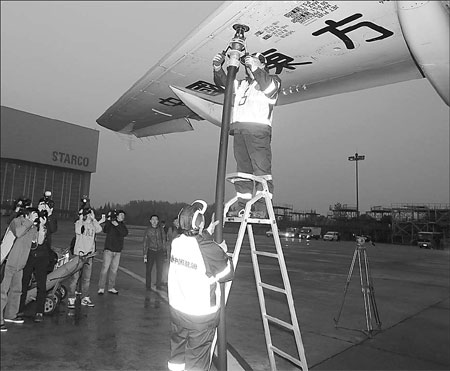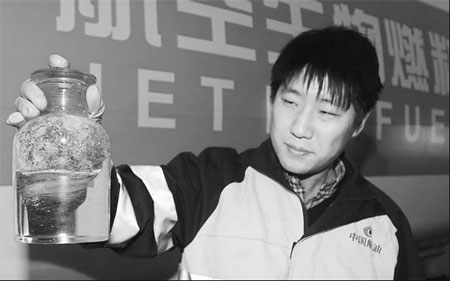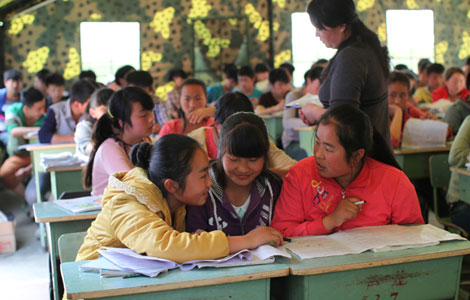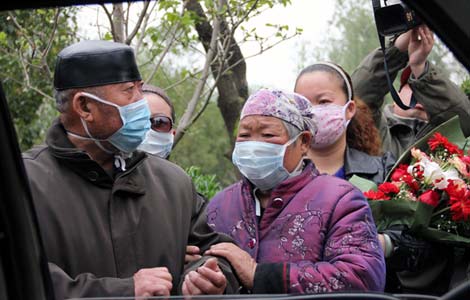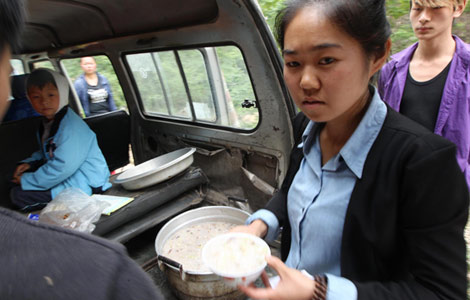China Eastern tests flight using biofuel
Updated: 2013-04-25 08:11
By Wang Ying in Shanghai (China Daily)
|
||||||||
|
Workers fuel a China Eastern Airlines airplane that uses biofuel for a trial flight early on Wednesday morning in Shanghai. Photos by Liu Xin / for China Daily |
|
A worker takes samples of biofuel. |
Airline wants to become more environmentally friendly business
China Eastern Airlines completed its first successful test flight of an aircraft powered by biofuel on Wednesday.
The company said it now plans to introduce biofuel for commercial flights to reduce carbon emissions, although it has not revealed a timetable.
"Biofuel-powered aircraft make our flights more environmentally friendly," said Captain Liu Zhimin, who piloted Wednesday's flight.
The jet, which used a palm oil biofuel made by China Petroleum and Chemical Corp, or Sinopec, Asia's largest oil refiner, flew for 85 minutes after taking off from Shanghai Hongqiao International Airport.
Liu said he performed several extreme maneuvers, including diving above 12,000 meters, but found no significant difference between the Sinopec biofuel and gasoline. The plane's left fuel tank was filled with gasoline to allow him to compare.
"The performance of the biofuel during the takeoff was powerful," the pilot added.
Sinopec is the first company in China to master the technology of turning palm oil and waste cooking oil into jet biofuel.
"We have developed two kinds of biofuel, palm oil and waste cooking oil, and the fuel we used during this flight was palm oil," Huang Zhongwen, deputy director of publicity for Sinopec Zhenhai Refining and Chemical Co, told China Daily.
"We have the capability of turning waste cooking oil into jet fuel, although the cost will be higher than producing ordinary fuel," he said, without providing specifics on the cost difference.
Waste cooking oil is dubbed gutter oil in China as illicit oil producers have recycled waste oil collected from gutters behind restaurants. The oil, which contains carcinogenic substances, is dangerous to human health.
The test flight opened up the possibility of using other types of biofuel, including those made from recycled gutter oil, for aviation purposes, said Zhao Xuebing, a lecturer specializing in bio-energy research at Tsinghua University.
But Zhao cast doubt on the commercial viability of biofuel for use in jets because the treatment process of producing biofuel will push the cost up higher than regular fuel refinery.
"I do not see biofuel used widely in commercial flights in the next decade," Zhao said.
In October 2011, Air China became the nation's first carrier to test a flight partly powered by biofuel, the outcome of a collaboration between PetroChina and Honeywell UOP's Green Jet Fuel.
Honeywell UOP has licensed its green diesel production technology to four producers in the US and Europe.
The first of those facilities is expected to begin producing fuel in May, the US-based conglomerate told China Daily.
Although bio feedstock is more expensive than oil, Honeywell expects costs to come down as investments are made to produce larger quantities of bio feedstock and the company achieves economies of scale.
Biofuel production will emerge to be one of the many solutions to meet the growing global demand for energy, especially transportation fuel, while minimizing greenhouse gas emissions, according to Honeywell.
wang_ying@chinadaily.com.cn
(China Daily 04/25/2013 page4)
Most Viewed
Editor's Picks

|

|

|

|

|

|
Today's Top News
Sluggish growth takes its toll on foreign lenders
Investors find a home in overseas real estate
More Chinese travel overseas, study reveals
Xi meets former US heavyweights
Li in plea to quake rescuers
Canada to return illegal assets
Beijing vows to ease Korean tensions
Order restored after deadly terrorist ambush
US Weekly

|

|
